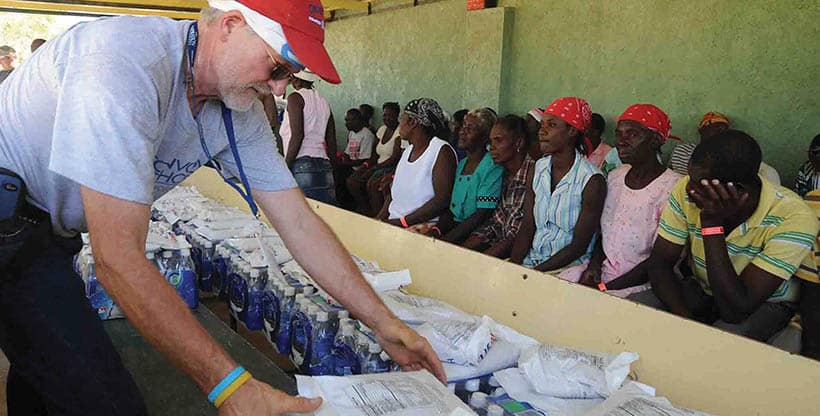Organizations
Achieving Effective Risk Management & Preparedness

Preparing for Risks with Confidence and Clarity
Your organization serves with a purpose, and when duty calls, you’re ready to engage on the front lines. However, if you’re assisting in a high-crisis situation, there’s nothing more important than preparing for risks and having the right plans and safeguards in place. That way, you can focus on your mission and handle unexpected challenges with confidence.
What Does it Mean to be Prepared for Risk?
There is no one-size fits all solution for risk preparation. You must analyze your situation carefully, understand what scenarios could affect you, and have appropriate insurance solutions for those scenarios. So, before you map out your mission, you should have a clear understanding of:
Where Your Operations and Staff are Located
Understanding the natural, cultural, and political landscape your organization and staff will reside on is vital for risk preparation and planning. Is the location subject to climate risks or natural disasters? Do the locals understand why your organization is there and what you’re trying to accomplish? Is your staff suitably trained and well-equipped to work in this location given the risks they could endure? These are important questions to ask.
You should also consider the geopolitical implications, as these can have immediate and severe impacts on your operations. What is the local government like and is it stable? Do they recognize why you’re there and support your activities? Are there political forces that could threaten the region’s stability, affect your efforts, and harm your staff? If so, make sure everyone involved with your mission is suitably trained and that appropriate measures are in place to account for any situation.

The Scenarios That Could Affect Your Operations
Once you fully understand the situational risks, it is important to pinpoint specific scenarios you and your staff might endure. If you’re working in a high-risk, crisis environment, these are a few you should think about:
- Day-to-day accidents: Staff or contractors enduring slips, trips and falls, or injuries from equipment.
- Targeted violence: Physical harm to staff and contractors from local citizens, government force (police, military, etc.), injuries sustained due to political violence/instability, or war and terrorism.
- Kidnap and ransom: Abduction of staff, contractors and other officials on site.
- Health and potential disease: Disease and other illnesses caught by staff, contractors and other officials within your organization.
Your Business Continuity Plan
After you’ve gained an understanding of the risks in your environment and the specific scenarios that could play out, you can factor all of those into your business continuity plan. A continuity plan can help protect you, your staff and your organizational assets. It can also allow your organization to adapt quickly and efficiently in the event of a disruption or a disaster.
The Senior Vice President of Clements Worldwide recently stated in an interview with Insurance Business Magazine about how important a business continuity plan is to keep organizations moving forward in the event of a crisis:
“Having a robust and up-to-date business continuity plan is vital at both a global and local level,” Bhargava said. “It provides employers and employees with a clear framework and procedural guide that can help in times of crisis.”

Effective Risk Management
Preparation is key when bad situations limit your options. Insurers and risk professionals have a wealth of information and can access specific tools to help measure and monitor risk. These tools are vital in ensuring an organization’s operations and employees are protected in bad situations. Insurers can also provide organizations with specific add-ons as part of the insurance solutions aligned to their operations, such as ongoing crisis management advice and evacuation support – these are especially critical when things take a turn for the worse.
Finding the Right Solutions
Whether your organization is currently operating abroad or planning to, you should always review your insurance policy to verify all your risks are covered. The last thing you want is to file a claim only to find out that you’re underinsured or that none of your risks are covered under your current policy. To avoid this and other major interruptions, make sure you:
Have the Right Contractual Requirements
Operating abroad can come with specific contractual requirements to operate. Ensuring you are aware of and operating in accordance with these requirements can help ensure the success of both your bid and mission.
For instance, contractors partnering with the US Federal Government must obtain DBA insurance when performing duties overseas. Your DBA coverage must also be approved by the US Department of Labor. If you don’t have approved coverage in place, it can hinder your ability to win future government contracts.
Check That Your Current Provider(s) Covers Everything You Need
If your current policy covers all your risks, you’re prepared. If it doesn’t, update it or find an insurer that covers everything you need ASAP – your coverage level could be the difference between a minor inconvenience and a major disruption.
An Example of Being Properly Insured
For one international school in Myanmar, enacting their emergency evacuation policy helped them recover much quicker than they would have otherwise. Due to the recent coup in the country and the pandemic, the school was forced to evacuate staff and their families, resulting in an extended school closure. Not only did operations cease, but they also had to continue paying out salaries, paying out severance due to terminations and eventually faced lawsuits due to those terminations. Those costs combined resulted in around $525,000 USD in losses. But because the school was covered for all these incidences, they didn’t have to pay these costs out of their contingency fund, which allowed them to use that money for other purposes.
Align Coverage with Fewer Providers
Even if you have the necessary coverage, are you getting all of it from the same provider? When unfortunate events occur, you can’t afford to contact ten different insurers. If you have more than one provider, try and align with those that cover everything you need, making things much easier when you need to enact coverage.

Promote Operational Effectiveness with a Partner Who Cares
When you’re on the front lines of a natural disaster or geopolitical instability, partnering with a broker that can provide effective, comprehensive, and immediate coverage solutions can ease your worries and keep your focus on providing necessary services.
If you haven’t embarked on your mission yet, reach out to Clements Worldwide to learn more about how we can assist NGOs/nonprofits and government contractors like you.
If you’re already overseas, we are here to support you and can help answer any questions you might have about coverage and effective risk management.
Relevant Helpful Resources
Find tips, trends, and perspectives to help you confidently make decisions and navigate challenges internationally with peace of mind. Read how you can live, operate, and manage risks abroad.
International NGO Recruitment Strategies: Attract & Retain the Top Nonprofit Employees
How NGOs Can Hire for Impact and Build a Committed Workforce
Minimizing Risk, Maximizing Impact: Critical Insurance Coverages for NGOs
When you’re running an international nonprofit or NGO of any size, the nonprofit
International Group Personal Accident Insurance: When DBA Coverage is Not Enough
Created and reviewed by the Commercial Insurance and Underwriting experts at